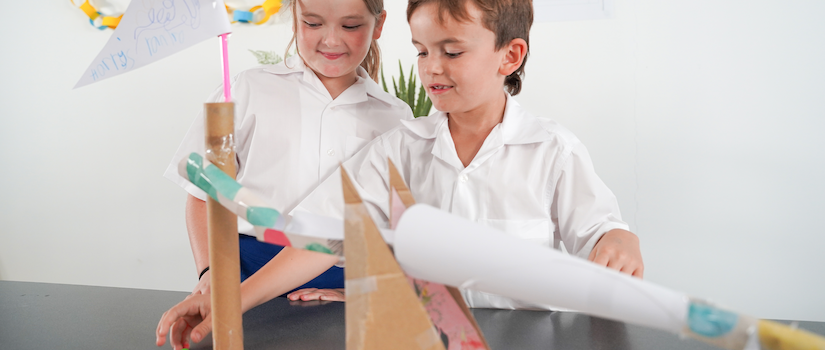Articles & Videos
An overview of Maths Trek investigations
Categories
Subscribe to our newsletters
Receive teaching resources and tips, exclusive special offers, useful product information and more!
An overview of Maths Trek investigations
Maths Trek 6/6/24

One of the fundamental (and fun) features of the Maths Trek program is the investigations. Investigations allow students to explore real-world contexts using their maths knowledge and critical thinking skills. From devising a café menu to building a pen at a zoo to planning a round-the-world trip, students apply their content knowledge and reasoning skills to consolidate their learning.
Every year level completes between four and eight investigations. Each Maths Trek investigation builds on previously learned material, ensuring a solid foundation for understanding. All you need to do is follow Maths Trek’s carefully structured teaching sequence to complete the prerequisite topics before starting the investigation. Investigations are designed to be completed over a week.
So, what do investigations look like for lower and upper primary classrooms? Let us walk you through it!
Investigations in Foundation–Year 2
To prepare for the investigation, use the detailed teaching notes at Maths Trek Online. These step-by-step guides include a list of required materials, prerequisite topics, focus questions, and projectable and printable resources to support explicit instruction.
The first step in each Investigation is to project and read the investigation introduction from the Student Book. This stimulus provides an opportunity for you to give students an overview of the investigation and conduct a quick discussion to ensure they have a good understanding of the task ahead.
Investigations in Years F–2 are teacher-led. Throughout the investigation, you’ll conduct whole-class, small group, paired and individual activities with your students using the resources provided at Maths Trek Online and in their Student Books. Each activity provides opportunities for teacher modelling, questioning, discussion, critical thinking and differentiation.
Critical thinking is also addressed in the final Share and discuss results teaching step of investigations. In Foundation students respond to carefully worded questions that act as discussion starters to develop their communication and critical thinking skills. For example in Investigation Oz-animal Olympics, the discussion questions include How many medals did each team win? and How many more medals did the Possums win than the Frogs?.
In Years 1 and 2 the discussion questions include cognitive verbs to help students articulate well-reasoned responses to communicate their understanding of what they have discovered. For example in Year 2 Investigation All about birthdays, the discussion prompts include Identify which month of the year and which day of the week are the most common for birthdays in the class and Explain how you would use the Class calendar to find the date of a classmate’s birthday or other special event. To help students understand how to respond to words like Identify and Explain (known as cognitive verbs), Years 1 and 2 also include a short critical thinking lesson that defines and models each cognitive verb using real-world maths examples.
Each investigation comes with an investigation report that includes a formative assessment checklist to help you identify a student’s ability to apply content and think critically.
Investigations in Years 3–6
To prepare for investigations in Years 3–6, use the detailed teaching notes at Maths Trek Online. These step-by-step guides include a list of required materials, prerequisite topics, focus questions, and projectable and printable resources to support explicit instruction.
The introductory lesson for each investigation provides an opportunity to discuss, learn or revise any important words in the context of the investigation. Many investigations also feature an engaging video to build excitement of the task ahead! At the end of the introductory lesson ensure students have all the materials they need to start the investigation.
Unlike the early years, investigations in Years 3–6 are mostly student-led. Students complete a mix of individual, paired and group activities using the resources provided at Maths Trek Online and in their Student Books. These activities provide opportunities for problem-solving, questioning, discussion and critical thinking.
In the final step of Years 3–6 investigations, you’ll find a dedicated tab at Maths Trek Online with detailed critical thinking notes to help you assess how well students are able to reflect, reason and communicate their understanding of what they have discovered. You’ll also find a short critical thinking lesson that defines and models each cognitive verb featured in the investigation questions using real-world maths examples.
Each investigation comes with a report that includes a formative assessment checklist to help you identify a student’s ability to apply content and think critically. Additionally, an inquiry question is included at the end of each investigation for students who need an extra challenge.
Bonus: Extra investigations!
If you find yourself with spare time at the end of the year, Years 1–6 include a number of extra investigations for you to complete with your students.
Maths Trek investigations are sure to add some buzz and excitement to your maths lessons. They allow students to explore maths through engaging, real-world contexts, creating a solid foundation of problem-solving and critical thinking skills, working towards a genuine passion for mathematics!
Get started with a free trial of Maths Trek to explore a selection of the investigations for yourself!